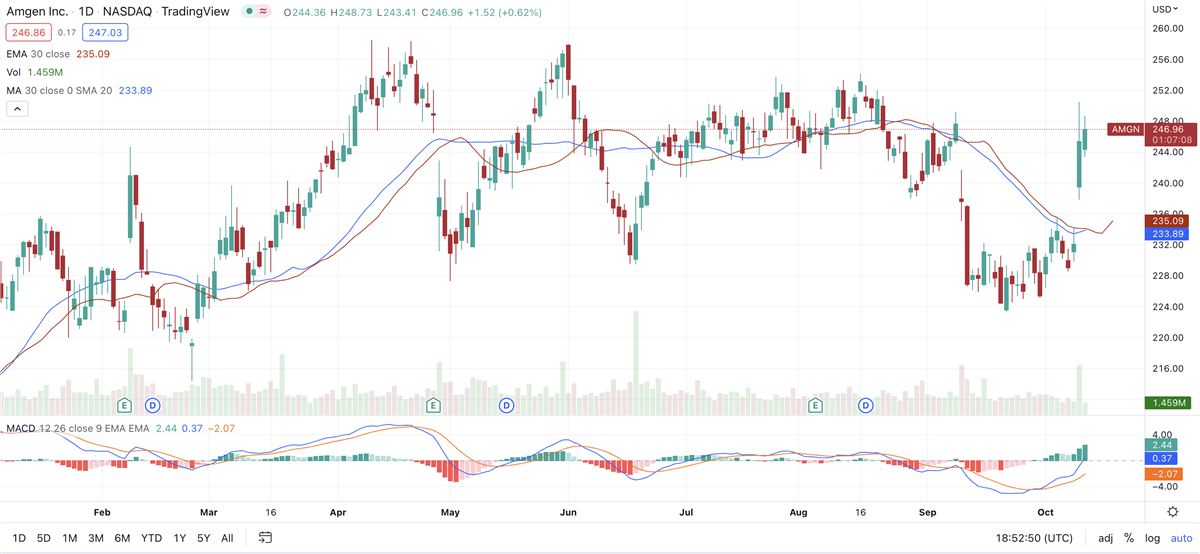Amgen Shares Leap Higher On Upbeat Outlook For Obesity Treatment Shares of Amgen soared 5.72% Tuesday and added to those gains Wednesday. The gap-up followed a Morgan Stanley upgrade and increase to the price target.
By Kate Stalter
This story originally appeared on MarketBeat

The idea of a pill or injection to accelerate weight loss has been a holy grail since at least the 1800s, but could Amgen (NYSE: AMGN) be on the verge of a medical breakthrough?
The pharma company's stock soared 5.72% Tuesday and was adding to those gains in Wednesday's session.
Tuesday's gap-up followed a Morgan Stanley upgrade to the stock. According to analyst data compiled by MarketBeat, Morgan Stanley boosted Amgen from equal weight to overweight, with a new price target of $279, an increase of 20.18%.
In a note, Morgan Stanley analysts cited AMG133, an anti-obesity treatment that Amgen mentioned in February of this year in a press release highlighting its growth strategy through 2030.
In clinical trials, Amgen saw weight loss after a single dose of AMG133, which obviously would be renamed once the product becomes commercialized.
It is one of several in the pipeline that were highlighted in the February news release.
When it comes to a potential blockbuster category, safe weight loss products rank right up there. There are certainly other FDA-approved treatments out there, but AMG133 functions by blocking proteins and hormones integral to blood sugar. That's a different technology than other systems currently available or in experimental phases.
Pharmaceutical rivals Novo Nordisk (NYSE: NVO) markets Wegovy for weight loss and Eli Lilly (NYSE: LLY) has been testing Tirzepatide for weight-loss applications.
In the Morgan Stanley note, analysts said there is potential for a "longer duration" of results with Amgen's product.
However you slice it, weight-loss drugs represent a lucrative opportunity for Amgen and its rivals. The medical community now classifies obesity as a chronic disease, not the result of lifestyle choices.
Amgen went public in 1983, and as such, is a mature, well-established company, meaning you wouldn't necessarily expect blowout earnings and revenue on a regular basis. Nonetheless, the company grew earnings by 163% in the most recent quarter, reporting $4.65 per share on revenue of $6.594 billion.
According to MarketBeat earnings data, Amgen exceeded views on the bottom line in each of the past five quarters. The company has long been profitable, although growth rates tend to ebb and flow. Amgen attributed a 2021 earnings decline to lower drug prices due to the pandemic, as fewer patients sought care for non-Covid conditions.
For 2022, Wall Street expects Amgen to earn $17.44 per share, an increase of 21%. That's seen growing another 8% next year, to $18.81 per share.
Amgen reports its third quarter on November 3, with Wall Street expecting earnings of $4.51 per share on revenue of $6.62 billion. Those would be decreases on both counts, but as long as the company meets or beats views, a year-over-year decline won't necessarily result in a price decrease.
The company has a long history of increasing its dividend. For established companies that aren't in fast-growth industries like tech, dividend increases are a way of attracting and retaining investment.
Amgen's current dividend yield is 3.14%, with a yearly dividend of $7.76 per share, MarketBeat data show.
The company's year-to-date return is 11.69%, better than not only the broader market but also the S&P healthcare sector, of which it's a component, comprising 2.85% of overall sector weighting.
The stock's chart shows a correction that began in April. Amgen repeatedly hit resistance around $258 but hasn't approached that level since June, as the healthcare sector and broader market rolled over after a short-lived rally attempt fizzled. 
In 2021, Amgen shares fell to a low of $198.64, undercutting its prior structure low. That's a good sign, as it can set the stage for institutional investors to add to a position at a lower valuation. Thus far in its current consolidation, the stock has held above that 2021 low. As of Wednesday, it was holding well above its 50-day and 21-day moving averages, a sign of solid institutional support.










